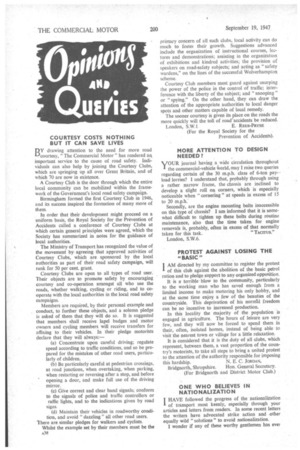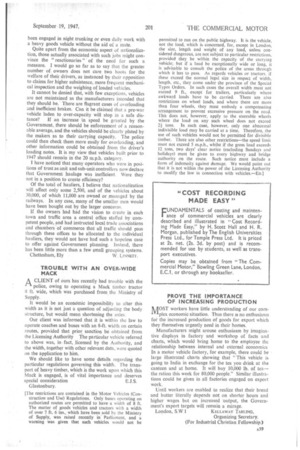COURTESY COSTS NOTHING BUT IT CAN SAVE LIVES PY drawing
Page 48

Page 49

If you've noticed an error in this article please click here to report it so we can fix it.
attention to the need for more road licourtesy, "The Commercial Motor" has rendered an important service to the cause of road safety. Individuals can also help by joining the Courtesy Clubs, which are springing up all over Great Britain, and of which 70 are now in existence.
A Courtesy Club is the door through which the entire local community can be mobilized within the framework of the Government's local road safety campaign_ Birmingham formed the first Courtesy Club in 1946, and its success inspired the formation of many more of them.
In order that their development might proceed on a uniform basis, the Royal Society for the Prevention of Accidents called a conference of Courtesy Clubs at which certain general principles were agreed, which the Society has summarized in notes for the guidance of local authorities.
The Ministry of Transport has recognized the value of the movement by agreeing that approved activities of Courtesy Clubs, which are sponsored by the local authorities as part of their road safety campaign, will rank for 50 per cent. grant.
Courtesy Clubs are open to all types of road user. Their objects are to promote safety by encouraging courtesy and co-operation amongst all who use the roads, whether walking, cycling or riding, and to cooperate with the local authorities in the local road safety campaigns.
Members are required, by their personal example and conduct, to further these objects, and a solemn pledge is asked of them that they will do so. It is suggested that members shall receive lapel badges and motor owners and cycling members will receive transfers for affixing to their vehicles. In their pledge motorists declare that they will always:—
(a) Concentrate upon careful driving; regulate speed according to traffic conditions, and so be prepared for the mistakes of other road users, particularly of children.
(b) Be particularly careful at pedestrian crossings, at road junctions, when overtaking, when parking, when restarting or reversing after a stop, and before opening a door, and make full use of the driving mirror.
(c) Give correct and clear hand signals; conform to the signals of police and traffic controllers or raffle lights, and to the indications given by road signs
(d) Maintain their vehicles in roadworthy condition, and avoid " dazzling " all other road users. There are similar pledges for walkers and cyclists. Whilst the example set by their members must be the A38
primary concern of all such clubs, local activity can do much to fostei their growth. Suggestions advanced include the organization of instructional courses, lectures and demonstration's; assisting in the organization of exhibitions and kindred activities; the provision of speakers on road-safety subjects; and acting as "safety wardens," on the lines of the successful Wolverhampton scheme.
Courtesy Club members must guard against usurping the power of the police in the control of traffic; interference with the liberty of the subject; and " snooping " or "spying." On the other hand, they can draw the attention of the appropriate authorities to local danger spots and other matters capable of local remedy.
The sooner courtesy is given its place on the roads the more quickly will the toll of road accidents be reduced.
London, S.W.1 E. REES-PRYSE (For the Royal Society for the Prevention of Accidents).
MORE ATTENTION TO DESIGN NEEDED?
'y VOUR journal having a wide circulation throughout OUR commercial-vehicle itvorld, may I raise two queries regarding certain of the 30 m.p.h_ class of 6-ton payload lorries? I understand that, probably through using a rather narrow frame, the chassis are inclined to develop a slight roll on corners, which is especially noticeable when "cornering" at speeds in excess of 15 to 20 m.p.h.
Secondly, are the engine mounting bolts inaccessible on this type of chassis? I am informed that it is somewhat difficult to tighten up these bolts during routine maintenance, also that the time taken for engine removals is, probably, often in excess of that normally taken for this task. " TACITUS." London, S.W.6.
PROTEST AGAINST LOSING THE "BASIC"
1 AM directed by my committee to register the protest A of this club against the abolition of the basic petrol ration and to pledge support to any organized opposition.
It is a terrible blow to the community, particularly to the working man who has saved enough from a limited income to make motoring his only hobby, and at the same time enjoy a few of the beauties of the countryside. This deprivation of his normal freedom can be no incentive to increased production.
In this locality the majority of the population is engaged in agriculture. The hours of leisure are very few, and they will now be forced to spend them in their, often, isolated homes, instead of being able to visit the nearest town or village for a little relaxation.
It is considered that it is the duty of all clubs, which represent, between them, a vast proportion of the country's motorists, to take all steps to bring a united protest to the attention of the authority responsible for imposing
this hardship. N. E. C. JORDAN,
Bridgnorth, Shropshire. Hon. General Secretary. (For Bridgnorth and District Motor Club.)
ONE WHO BELIEVES IN NATIONALIZATION
IHAVE followed the progress of the nationalization I of transport most keenly, especially through your articles and letters from readers. In some recent letters the writers have advocated strike action and .other equally wild " solutions " to avoid nationalization.
I wonder if any of these worthy gentlemen has eve' been engaged in night trunking or even daily work with a heavy goods vehicle without the aid of a mate.
Quite apart from the economic aspect of nationalization, those actually associated with such jobs might convince the " reactionaries " of the need for such a measure. I would go so far as to say that the greater number of owners does not care two hoots for the welfare of their drivers, as instanced by their opposition to claims for higher subsistence, more frequent mechanical inspoction and the weighing of loaded vehicles.
It cannot be denied that, with few exceptions, vehicles are not maintained as the manufacturers intended that they should be. There are flagrant cases of overloading and inefficient brakes. Can it be claimed that a pre-war vehicle laden to over-capacity will stop in a safe dis tance? if an increase 'in speed be granted by the Government, there should be enforcement of a reasonable average, and the vehicles should be clearly plated by the makers as to their carrying capacity. The police could then check them more easily for overloading, and other information could be obtained from the driver's loading notes. It is my view that vehicles built prior to 1947 should remain in the 20 m.p.h. category.
I have noticed that many operators who were in positions of trust as unit and sub-unit controllers now declare that Government haulage was inefficient. Were they not in a position to create efficiency?
Of the total of hauliers, I believe that nationalization will affect only some 2,500, and of the vehicles about 30,000, of which 11,000 are owned or managed by the railways. In any case, many of the smaller men would have been bought out. by the larger concerns.
If the owners had had the vision to create in each town and traffic area a central office staffed by competent people, and had instructed local trade associations and chambers of commerce that all traffic should pass through these offices to be allocated to the individual hauliers, they would not have had such a hopeless case to offer against Government planning. Instead, there has been little more than a few small grouping systems.
Chettesham, Ely W. L I NNETT TROUBLE WITH AN OVER-WIDE MACK
A CLIENT of ours has recently had trouble with the j—k police, owing to operating a Mack timber tractor 8 ft. wide, which was purchased from the Ministry of Supply.
It would be an econdmic impossibility to alter this width as it is not just a question of adjusting the body structure, but would mean shortening the axles.
Our client was informed that it is within the law to operate coaches and buses with an 8-ft. width on certain routes, provided that prior sanction be obtained from the Licensing Authority the particular vehicle referred to above was, in-fact, licensed by the Authority, and the Width, together with other relevant data, were quoted on the application to him.
We should like to have some details regarding the particular regulations governing this width. The transport of heavy timber, which is the work upon which this Mack is engaged, is of vital importance and deserves special consideration E.J.S. Glastonbury.
[The restrictions are contained in the Motor Vehicles (Construction and Use) Regulations. Only buses operating on authorized routes are permitted to havea width of 8 ft. The matter of goods vehicles and tractors with a width of over 7 ft. 6 ins., which have been sold by the Ministry of Supply, was raised recently in Parliament, and a warning was given that such vehicles would not be permitted to run on the public highway. It is the vehicle, not the load, which is concerned, for, except in London, the size, length and weight of any load, unless considered dangerous, are not subject to particular restrictions, provided they be within the capacity of the carrying vehicle; but if a load be exceptionally wide or long, it is advisable to consult the police of the areas through which it has to pass. As regards vehicles or tractors, it these exceed the normal legal size in respect of width, length, etc., they come under the province of the Special Types Orders. In such cases the overall width must not exceed 9 ft., except for trailers, particularly where awkward loads have to becarried. There are also restrictions on wheel loads, and where there are more than four wheels, they must embody a compensating arrangement to prevent excessive pressure on the road. This does not, however, apply to the steerable wheels where the load on any such wheel does not exceed 2=1 tons. In each case, however, only one abnormal indivisible load may be carried at a time. Therefore, the use of such vehicles would not be permitted for divisible Limber, There are also other restrictions—the speed limit must not exceed 5 m.p.h., whilst if the gross load exceeds 12 tons, two days' clear notice (excluding Sundays and holidays) must be given to every highway and bridge authority on the route. Such notice must include a form of indemnity against damage. We would point out that it is not within the. power of the Licensing Authority to modify the law in connection with vehicles.—Eo.1
PROVE THE IMPORTANCE OF INCREASING PRODUCTION MOST workers have little understanding of our cornI viplex economic situation. Thus there is no enthusiasm for the increased production of goods for export which they themselves urgently need in their homes.
Manufacturers might arouse enthusiasm by imaginative displays in factory and workshop of facts and charts, which would bring home to the employee the relationship between internal and external economics In a motor vehicle factory, for example, there could be large illustrated charts showing that "This vehicle is going to India in exchange for the tea you drink at the canteen and at home. It will buy 10,000 lb. of tea— the ration this week for 80,000 people." Similar illustrations could be given in all factories engaged on export work.
Until workers are enabled to realize that their bread and butter literally depends not on shorter hours and higher wages but on increased 'output, the Government's export targets will remain a mirage.
London, S.W 1 KELLAwAv TARLINP,
(For Industrial Christian Fellowship.)












































































